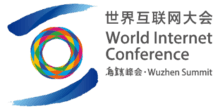World Internet Conference
| World Internet Conference 世界互联网大会 | |
|---|---|
 | |
| Status | Active |
| Location(s) | Wuzhen, Zhejiang Province |
| Country | China |
| Inaugurated | November 19, 2014 |
| Organized by | Cyberspace Administration of China and People's Government of Zhejiang Province |
| Website | |
|
(Chinese) www www | |
| World Internet Conference | |||||||
| Simplified Chinese | 世界互联网大会 | ||||||
|---|---|---|---|---|---|---|---|
| Traditional Chinese | 世界互聯網大會 | ||||||
| |||||||
| Wuzhen Summit | |||||||
| Simplified Chinese | 乌镇峰会 | ||||||
| Traditional Chinese | 烏鎮峰會 | ||||||
| |||||||
The World Internet Conference (simplified Chinese: 世界互联网大会; traditional Chinese: 世界互聯網大會; pinyin: Shìjiè Hùliánwǎng Dàhuì), also known as Wuzhen Summit (simplified Chinese: 乌镇峰会; traditional Chinese: 烏鎮峰會; pinyin: Wūzhèn Fēnghuì), is an annual event, first held in 2014, organized by government agencies in China to discuss Internet issues and policy.[1]
Wuzhen Declaration
At the first World Internet Conference in 2014, an unknown party distributed a draft joint statement affirming the right of individual nations to develop, use, and govern the Internet, a concept Chinese leader Xi Jinping calls cyber sovereignty.[2] Attendees received a draft of the statement overnight, slid under their hotel doors. Some objected to the statement, and the organizers made no mention of it in the conference's final day.[3]
Press access
World Internet Conference organizers have denied entry to reporters for certain Western media outlets, such as The New York Times.[1][4]
Reporters Without Borders called for a boycott of the 2015 World Internet Conference.[5]
2015 edition
The second World Internet Conference, also held in Wuzhen, Zhejiang was attended by notable figures including internet entrepreneur Jack Ma, Chinese paramount leader Xi Jinping, and the prime ministers of Russia, Pakistan, Kazakhstan, and Kyrgyzstan.[6] Chinese netizen called it the second third world internet conference,as only eight countries that sent representatives to the Conference score above average of Informatization Development Index.It looked like that China wanted to unite those third world countries which desire for economic aid or deeply doubts of Western democracy.[7] Xi promoted his concept of "internet sovereignty", urging the world to "respect each country’s internet sovereignty, respect each country’s right to choose their own development path and management model of the internet". Xi's speech was praised by Ma.[6] The official Chinese media commented that the Chinese President Xi Jinping's speech showed China was bullish on Internet growth and China would build a "Digital Silk Road for Win-Win Cooperation-Information Infrastructure Partnership".[8] The second World Internet Conference releases the Wuzhen Initiative, which calls on all countries to promote Internet development, foster cultural diversity in cyber space, share the fruits of Internet development, ensure peace and security in cyber space, and improve global Internet governance. [9] However, the event was criticised by Amnesty International, which called on technology companies to boycott the conference.[6] Amnesty International urged tech firms to reject China's position, calling it an attempt to promote censorship and surveillance.[10]
In December 2015 Fadi Chehadé announced that, after he leaves his post as ICANN CEO in March 2015, he will become co-chair of a newly formed advisory committee to the World Internet Conference. The first meeting of the committee will take place in mid 2016.[11]
Controversies
Press freedom and human rights groups expressed concerns about the conference that one of its aims was to promote China's Internet policies, and some Chinese netizen take it as a joke, call it Local Area Network Conference(局域网大会).[12]
References
- 1 2 Makinen, Julie; Yang, Yingzhi; Li, Alexandra (2015-12-15). "'Freedom requires strict order': China preps for second World Internet Conference". Los Angeles Times. Retrieved 2015-12-16.
- ↑ "Xi Jinping calls for 'cyber sovereignty' at internet conference". BBC. 2015-12-15. Retrieved 2015-12-16.
- ↑ "China Delivers Midnight Internet Declaration — Offline". China Real Time Report. 2014-11-21. Retrieved 2015-12-16.
- ↑ Zeng, Vivienne (2015-12-15). "Not shared by all? China blocks New York Times from World Internet Conference". Hong Kong Free Press. Retrieved 2015-12-16.
- ↑ Carsten, Paul (2015-12-16). "China calls for Internet front to fight hacking, cyber 'arms race'". Reuters. Retrieved 2015-12-16.
- 1 2 3 Zeng, Vivienne (18 December 2015). "Albaba's Jack Ma sings praises of Xi's global vision of 'internet management'". Hong Kong Free Press.
- ↑ 方可成 (18 December 2015). ""外交"是中国举办"世界互联网大会"的本质". 端传媒. Retrieved 30 December 2015.
- ↑ "Xi's speech: Reactions from the ground". China Daily. 2015-12-17. Retrieved 2015-12-17.
- ↑ Zhu, Shenshen (29 December 2015). "Wuzhen initiative on Internet future". Hong Kong Free Press.
- ↑ Griffiths, James (2015-12-16). "Chinese President Xi Jinping: Hands off our Internet". CNN. Retrieved 2015-12-16.
- ↑ Chehadé, Fadi (23 December 2015). "My Transition from ICANN CEO, an Update". ICANN Blog. ICANN. Retrieved 24 December 2015.
- ↑ "局域网大会". 中国人权双周刊. 20 December 2015. Retrieved 30 December 2015.
External links
- Official website
- Official website (Chinese)